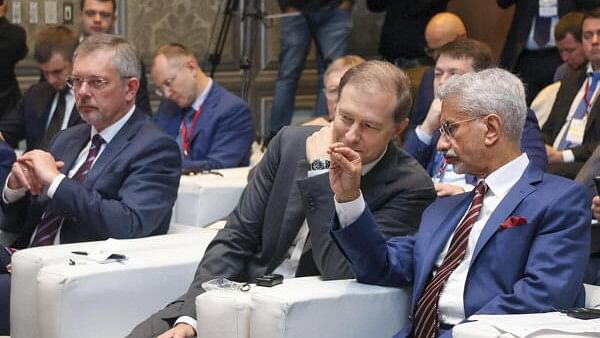
External Affairs Minister S Jaishankar at the India-Russia Business Forum, in Mumbai, Monday.
Credit: PTI Photo
New Delhi: India is keen to build long-term energy partnership with Russia notwithstanding western frowns but wants urgent measures, including settlement in national currencies, to narrow the bilateral trade deficit, which widened to $57.18 billion dollar in 2023-24, mainly due to rise in imports of crude oil from the former Soviet Union nation.
New Delhi also wants to expedite its negotiation with Moscow for a bilateral investment treaty.
“The balance of trade needs urgent redressal since it is so one-sided,” External Affairs Minister S Jaishankar said at India-Russia business forum in Mumbai. With Deputy Prime Minister Denis Manturov of President Vladimir Putin’s administration present at the event, Jaishankar sent out a message to Moscow underlining New Delhi’s call for Russia to remove non-tariff barriers and regulatory impediments to help raise exports from India.
India raised its oil import from Russia, defying the sanctions imposed by the US and the European Union on Russia after the former Soviet Union nation launched its special military operations in Ukraine in February 2022.
The value of India’s crude oil import from Russia went up from just about $2.5 billion in 2021-22 to $31 billion in 2022–23.
Despite drawing flak from the US and the other western nations, India continued to increase its import of crude oil from Russia, arguing that its move in fact was helping lessen the volatility in the global energy market. New Delhi also pointed out that the Europe had imported much more oil from Russia than India after the war started in Ukraine.
New Delhi’s move, however, resulted in widening the imbalance in India-Russia trade. India’s imports from Russia went up to $61.44 billion while exports were at $4.26 billion in 2022-23.
“Mutual settlement of trade in national currencies is of great importance, especially in the current circumstances,” Jaishankar said, adding: “Special Rupee Vostro Accounts are right now an effective mechanism. However, even in the short run, a better trade balance with national currency settlements is the answer”.
Putin hosted Prime Minister Narendra Modi in Moscow in July and they agreed to set a new target of taking the bilateral trade volume to $100 billion by 2030.
“Our approach is not transactional but aimed at building long-term partnerships. In energy domains such as oil, gas, coal or uranium, India will always be a major player in the international markets. This applies as well to the demand for fertilizers of various kinds,” said the external affairs minister. “Constructing a mutually beneficial arrangement will help [Russia and India] address the volatility and the uncertainty of our times.”
